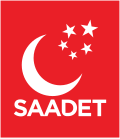This article needs to be updated.(November 2023) |
Below are lists of political parties espousing Islamic identity or political Islam in various approaches under the system of Islamic democracy. Islamic democracy refers to a political ideology that seeks to apply Islamic principles to public policy within a democratic framework. Lists are categorized by the ideological affiliation and sorted by the country of origin.
Contents
- Islamic democratic centrist, liberal, moderate, and progressive
- Banned parties
- Non-legislature notable parties
- Islamist
- Sunni
- Shia
- Salafist
- Banned Salafist parties
- Non-legislature Salafist parties
- Defunct Salafist parties
- Sufism and Ash'arism
- Non-legislature parties
- Islamic socialist
- Banned socialist parties
- Non-legislature socialist parties
- Defunct socialist parties
- See also
- References



















